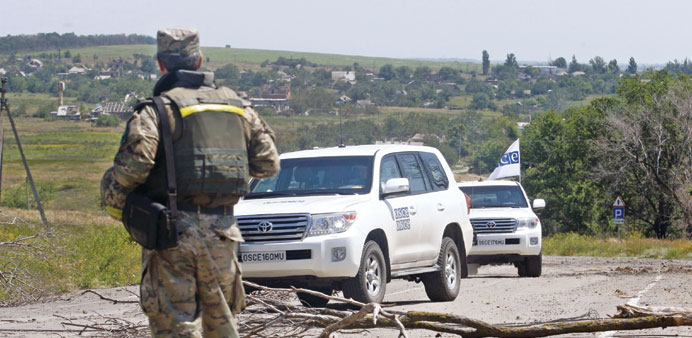DPA/AFP
Berlin/Kiev
The situation in eastern Ukraine has deteriorated significantly in the last week, the Organisation for Security and Co-operation in Europe (OSCE) warned yesterday, with heavy weaponry such as tanks and howitzers spotted along the front lines.
Such weapons were supposed to have been removed according to an agreement signed by the government and pro-Russian separatists in February, the deputy head of the Ukraine mission, Alexander Hug, said during a visit to the port city of Mariupol.
There had been an alarming increase in the number of rebel and government checkpoints, which were becoming targets for attacks and therefore endangering civilians stuck in the queues of cars that build up at them, Hug said.
Fighting was reported in the contested regions of Donetsk and Luhansk regions, while both sides accused the other of violating the ceasefire.
At least five government soldiers were killed when a landmine in the conflict zone exploded, a presidential spokesman said yesterday in Kiev, adding that 10 other troops have been injured in fighting over the past 24 hours.
“Five of our soldiers died and three more were wounded as a result of a landmine explosion” some 45km from the pro-Russian rebel hub Luhansk, military spokesman Oleksandr Motuzyanyk told reporters.
Seven more soldiers were injured over the past 24 hours in other hotspots in eastern Ukraine, where more than 6,500 people have been killed over the last 15 months.
Motuzyanyk added that the situation in the war zone “remains difficult” and accused the separatists of using artillery prohibited by the Minsk truce deal signed in February.
Western powers, Russia and the OSCE have repeatedly urged the two sides to respect the deal, which also demanded the immediate withdrawal of heavy weapons from the front.
Daily exchanges of fire have continued to add to the death toll however.
In Berlin, a government document seen by DPA showed that the German Army, the Bundeswehr, plans to take part in two military operations in Ukraine this summer.
The plan was to have “individual personnel” take part in the ground exercise Rapid Trident as well as the marine exercise Sea Breeze, a written reply by the Foreign Office to an opposition request in parliament said.
The Bundeswehr took part in the same manoeuvres in 2014 in spite of the conflict between pro-Russian separatists and government forces in east Ukraine.
Moscow protested the operations at the time.
Rapid Trident is scheduled to take place in Yavoriv in western Ukraine 50km from Lviv and is expected to involve 1,800 troops from 18 countries, a significant increase on the 1,200 that took part past year.
The US-led operation is expected to last 11 days and is due to be launched with an official ceremony on July 20.
Sea Breeze, a joint US-Ukraine operation, is expected to last from August 31 to September 12 in the Black Sea.

OSCE vehicles enter the village of Shyrokyne, in the Donetsk region, on Saturday.
